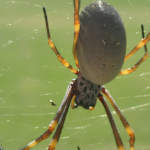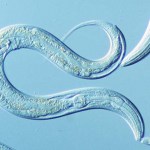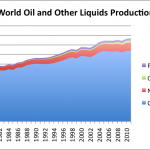growth
Estradiol is the major estrogen in humans. Chemical structure by NEUROtiker (Own work) [Public domain], via Wikimedia Commons
I came across an article published in Physiological Reviews with a title so irresistible (Estrogens in Male Physiology), I just had to read it. While I knew that males have estrogen, this article impressed me with the numerous things estrogens are associated with, some of which were new to me and highlight how important estrogens are to male reproductive and non-reproductive physiology.
As early as the 1930's researchers discovered that stallions had…
Image of a gilthead sea bream by Roberto Pillon - via Wikimedia Commons
Similar to humans, muscle growth in fish is increased with exercise. Unlike humans, however, teleost fish are able to continue growing in length as well as weight throughout their lives. This type of meat, I mean muscle, growth happens in two ways: 1) muscle cells get bigger and 2) new muscle cells form. Researchers at the University of Barcelona in Spain wanted to know what effect moderate sustained swimming would have on the muscles of young fingerling gilthead sea bream, a type of…
Image of gilthead sea bream By Roberto Pillon - http://www.fishbase.us/photos/UploadedBy.php?autoctr=13070&win=uploaded, CC BY 3.0, https://commons.wikimedia.org/w/index.php?curid=20825139
A new study published in the American Journal of Physiology - Regulatory, Integrative and Comparative Physiology explored the effects of exercise on growth and hormone regulation in gilthead sea bream (Sparus aurata). The main hormones that regulate growth are, perhaps not surprisingly, growth hormone and insulin-like growth factor. Researchers discovered young gilthead seam bream that underwent…
Image of chicken egg from Wikimedia Commons.
Turns out the egg is an important phase. A new study published this month in American Journal of Physiology - Regulatory, Integrative and Comparative Physiology looked at what happens in the egg when a chicken fetus was exposed to low oxygen (hypoxia) conditions. In mammals, this can occur as a result of maternal hypoxia, preeclampsia as well as anemia in the fetus resulting in less red blood cells that can carry oxygen. Understanding this is important as restricted fetal growth is associated with an increased risk…
I came across this neat press release from the American Physiological Society which describes new research on understanding how the genes of burmese pythons are actually altered by feeding. Fascinating! The research was published in the May issue of Physiological Genomics. Here is a brief synopsis. For the full story, visit the APS website.
Yep, that's a python eating a rodent.
What is so fascinating about Burmese pythons is that their body literally is reconstructed within 3 days of eating resulting in the doubling or organ size and a 10-44 fold increase in…
A new study from researchers at the University of Sydney shows that golden orb-weaving spiders (Nephila plumipes) that live in the city are larger and produce more offspring as compared to country living.
When they say the spiders are big, they mean really big. The females can reach up to 20-25mm (males are only ~5mm).
Image from Spiders of Australia http://ednieuw.home.xs4all.nl/australian/nephila/Nephila.html
The researchers speculate that the urban heat island effect, which is attributed to a lack vegetation and hard surfaces, may lead to the increased body size as invertebrates in…
Image of C. elegans from http://www.easternct.edu/~adams/C.eleganslanding.html
New research published in PLOS Genetics shows that starving C. elegans (Caenorhabditis elegans) during the late larval stage of development when the worms are undergoing tissue growth and formation halts cellular activity at previously unknown checkpoints in their development. These findings show that nutrition is an important cue to signal whether or not the worms should continue on to the next stage of development. Interestingly, the two-week starvation period actually doubled the lifespan of the worms as…
"It is by going down into the abyss that we recover the treasures of life. Where you stumble, there lies your treasure." -Joseph Campbell
Ever since we created a question/suggestion box here, we've been deluged by far more excellent questions than one person could possibly answer, but that doesn't mean we aren't trying! For this week's Ask Ethan, our question comes from long-time fan and reader crd2, who asks:
As we look at the furthest quasars we see they have supermassive black holes, as large as 109 solar masses. By what mechanism are they able to reach such large sizes over so short…
"You must learn to talk clearly. The jargon of scientific terminology which rolls off your tongues is mental garbage." -Martin H. Fischer
I've always thought that the Universe is absolutely amazing; that everything from the tiniest indivisible particles all the way up to the largest structures and superstructures making up the Universe has an amazing story to tell, if only we can figure out its secrets.
Image credit: Boylan-Kolchin et al. (2009) for the Millenium-II simulation; MPA Garching.
When I first learned some of them for myself, I was a graduate student, immersed in the minutiae and…
"Black holes, which have no memory, are said to contain the earliest memories of the universe, and the most recent, too, while at the same time obliterating all memory by obliterating all its embodiments. Such paradoxes characterize these strange galactic monsters, for whom creation is destruction, death life, chaos order." -Robert Coover
Our Milky Way, the swath of light and dark that dominates the darkest skies here on Earth, contains a huge variety of stars: large and small, red and blue, from young to old to ancient.
Image credit: ESO / Serge Brunier, Frederic Tapissier, The World At…
The EIA, unlike the IEA, has been strident in its dismissal of peak oil. But the data that the EIA publishes tells a very different story than the one it wants us to hear. Gail the Actuary has a really good analysis up at the Oil Drum.. The essential message - that crude oil production remains basically flat, as it has since 2005, and that growth in non-crude "liquids" (all those things that have made up for the lack of crude growth in world demand) aren't growing as fast as desired or predicted.
Among the critical takeways - that unconventional oil production probably will cease to keep…
It was interesting to me that my comments that protesting the economy without also including elements of economic protest were taken to mean "I think Occupy Wall Street is bad." I still think that to be genuinely effective, protests of capitalism have to take into account what will replace it - and our own implication in the system, but I am happy to see the protests growing, and developing an emergent sense of possibility.
I think Jim Kunstler hit it on the head this week:
This is the funniest part to me: that leaders of a nation incapable of constructing a coherent consensus about reality…
I have a pretty good track record on the economic crisis. In 2007, I pointed out that the "slowdown" that people were saying was absolutely not a recession, was, in fact, a recession. In 2008, I pointed out that most major economic downturns of the past century haven't been very brief - although technically the 1970s economic crisis consisted of two recessions, rather than one, you could just as easily observe that it consisted of a decade or so of high unemployment, economic stagnation, etc...etc... I argued that it was likely that the major economic crisis we were finally acknowledging…
As I gear up to finish my Adapting-in-Place book, I've been thinking a lot about the role of the informal economy in supporting a culture that can't keep growing and consuming resources at the same rate. As those of you who have been following my work for a while know, the informal economy represents the larger portion of the world economy (3/4 of all economic activity) and includes a wide range of important activities. When the formal economy fails, the informal economy is needed - and yet we have stripped the informal economy over the last decades. How to rebuild is a huge question - and…
Interesting query and discussion at Martin Wolf's blog about how economics came to conflate natural resources and capital, and whether it should continue to do so. You'll want to read the comments too!
The idea that land and capital are the same thing is evidently ludicrous. It requires us to believe that the economic machine is self-sustaining -- a sort of perpetual motion machine. Capital is the product of savings and investment. It is the result of human frugality and the invention required to imagine and create new capital goods. Labour is also -- and in today's circumstances,…
The New Economic Foundation's Report on the infeasibility of continued economic growth is yet another bit of analysis that points out the obvious - we have radically overdrawn our resources and that has consequences. One of them is that we can't draw down natural resources infinitely. The other is that infinite economic growth is (duh) not possible. It also observes that continued economic growth isn't actually benefitting most of the people we ostensibly care about benefitting:
...Why growth isn't working
Between 1990 and 2001, for every $100 worth of growth in the world's income per…





